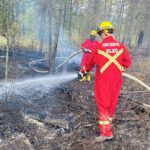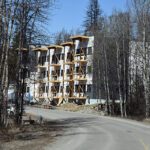Home »

This isn’t cold for those who remember 1950
Cold enough for you? Don’t complain. In the past, it’s been much colder than this and I’m not talking about the last Ice Age. Being the weather nut that I am, I have some records from Environment Canada and a fascinating article from the fall 2009 issue of British Columbia History Magazine, a downright chilling read.
The article by Dirk Septer describes the awesome cold snap that swept over B.C. for almost six weeks in late December 1949 and early January 1950; a winter that I can dimly remember myself.
What I remember is a bucket of snow that sat on the warming tray of our old wood stove in Kinnaird, now part of Castlegar. It was sitting there melting to provide us with water because the village water system had frozen up, a situation common to many B.C. municipalities that year quite possibly including Cranbrook.
I say this because according to Environment Canada records from a volunteer recorder in town before the weather station was moved to the airport in1968, our mean (average) temperature in January 1950 was minus -3 F. That’s right, Fahrenheit as it was measured in those days which would be minus 20.2 C. Damn cold no matter how you measure it. Cranbrook also recorded 94 cm (about three feet) of snow that month, which just goes to show that it can be snowy and cold at the same time.
In his article, Septer said unusually warm weather preceded the cold snap in mid-December 1949 with heavy rains flooding the Lower Mainland and parts of the Interior. But in late December, an “Arctic Express” swept out of the north and the rain quickly turned to snow, closing highways and rail lines and stranding 150 cars on the newly opened Hope-Princeton Highway and more than 1,800 passengers on the CPR and CNR passenger lines between Vancouver and Kamloops. Snowdrifts in the central Fraser Valley were as high as 15 feet (4.5 meters) and drivers were being rescued by the Royal Canadian Engineers at Camp Chilliwack.
 And it was cold! On Jan. 13, the mercury (it was mercury thermometers in those days) fell to zero F (minus 17.8 C) at the Vancouver Airport, a record unequaled to the present day. Meanwhile, Prince George recorded minus 57.5 F (minus 49.7 C), Kamloops hit minus 37.2 F, Lone Butte in the Cariboo minus 60 F (minus 51.1 C) and at Lac La Hache, also in the Cariboo, the temperature fell to an incredible minus 72 F (minus 57.8 C), one of the coldest temperatures ever recorded on the continent! The coldest temperature ever officially recorded in North America occurred at Snag, a now abandoned airstrip in the Yukon, where the mercury sank to a frigid minus 81 F (minus 63 C) on Feb 3, 1947. At that temperature, airport employees brave enough to go outside said they were spitting ice! Even boiling water thrown in the air turned to ice pellets before it hit the ground.
And it was cold! On Jan. 13, the mercury (it was mercury thermometers in those days) fell to zero F (minus 17.8 C) at the Vancouver Airport, a record unequaled to the present day. Meanwhile, Prince George recorded minus 57.5 F (minus 49.7 C), Kamloops hit minus 37.2 F, Lone Butte in the Cariboo minus 60 F (minus 51.1 C) and at Lac La Hache, also in the Cariboo, the temperature fell to an incredible minus 72 F (minus 57.8 C), one of the coldest temperatures ever recorded on the continent! The coldest temperature ever officially recorded in North America occurred at Snag, a now abandoned airstrip in the Yukon, where the mercury sank to a frigid minus 81 F (minus 63 C) on Feb 3, 1947. At that temperature, airport employees brave enough to go outside said they were spitting ice! Even boiling water thrown in the air turned to ice pellets before it hit the ground.
As for Cranbrook, the coldest temperature we’ve recorded since “official” records began at the airport in 1968 was minus 40 Dec. 30, 1968. Unfortunately, I don’t have the record minimums for 1949-50, only the averages. But if I did, I think it would be a safe bet that it went colder than 40 below back then and maybe on other occasions too. However, it should be kept in mind that Cranbrook is by no means the coldest location in the region as temperatures vary widely as you may have noticed from watching the thermometer in your vehicle. Cold air is heavy air, and when it’s still at night, cold air tends to sink to the lowest location which means that Wasa in the Trench is colder than Cranbrook on a still night with no wind and Cranbrook is colder than Kimberley under similar conditions as I can attest from years of commuting.
And I must emphatically state that one early cold snap doesn’t mean global warming is over. If anything, erratic outbursts of extreme weather, confirms the global warming theory. But I will say this: The latest scientific theory that global warming is 95 per cent caused by man-made impacts is up for debate. Scientific evidence also confirms that the world has been far warmer during past natural cycles and these natural cycles are still operating today.
In my tent there’s still room for people with open minds about global warming.
– Gerry Warner is a retired journalist and weather nut. He’s also a Cranbrook City Councillor, but his opinions are his own.








